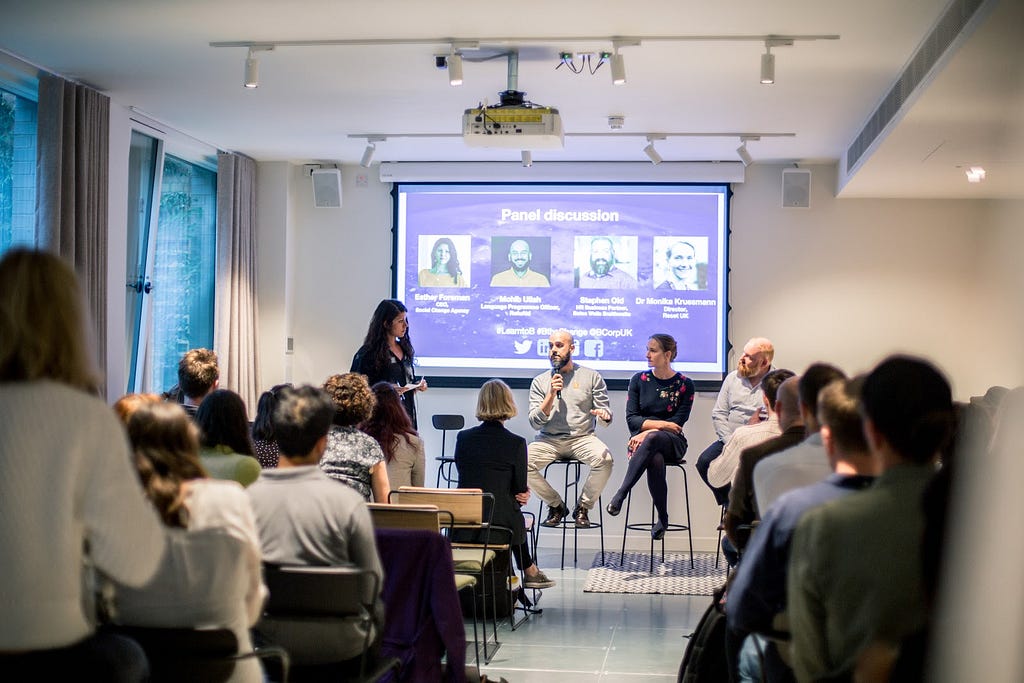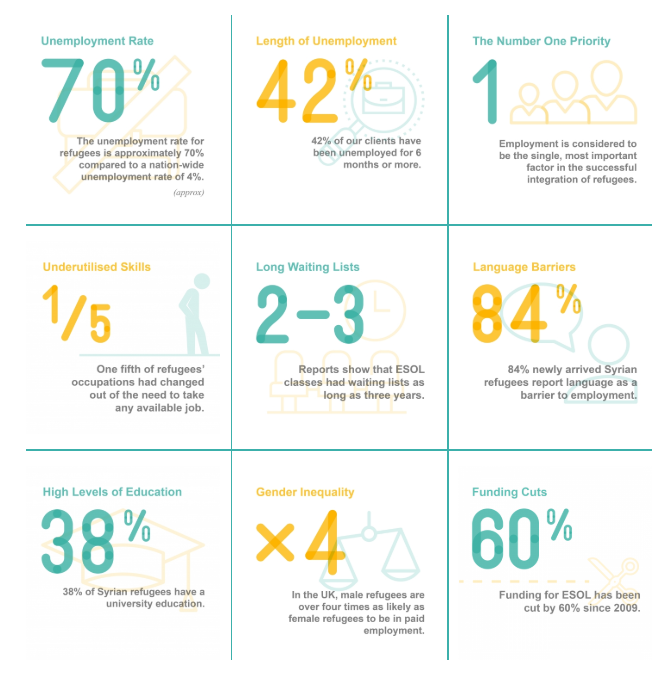UK Organizations Collaborate to Ease Language and Employment Barriers

B Lab UK recently hosted an event on how business can create social change. It included a panel addressing the question: How can we integrate marginalised populations into society and what are the practical steps we, as businesses and citizens, can take today?
The panel included Mohib Ullah, language officer at RefuAid, who shares his thoughts about the event in this article.
How I Regained Optimism at Learn to B: How Business Can Create Social Change
Recently I had the opportunity to join the panel at B Lab UK’s Learn to B event to discuss how businesses can welcome refugees. It was a privilege to share my experience and thoughts with a community of people who use business as a force for good. I can safely say that after attending the event, I have regained a sense of optimism that there is a brighter future if we all play our part. Today, I am writing to share my insights about how your business can help to change someone’s life for good!
After getting my status in 2015, not everything was promising, particularly on the employment side. Everyone appreciates that it is hard to get your foot in the door, as I’m sure most of you know from your own experiences of landing your first formal job. Now imagine a refugee: a foreigner with an ethnic-sounding name, a CV with no local job market experiences or UK references. All this can erase any chance of a call back from employers.
Fast forward to October 2016. Through a charity called Breaking Barriers, I managed to get my first formal part-time job at Wholegrain Digital, and after two weeks I accepted a full-time role there.
The B Impact Assessment was one of my first tasks, and in February 2017 Wholegrain received its status as a Certified B Corporation. I consider completing the BIA to be a personal milestone to date (I found it harder than my eight-hour interview with a Home Office official!). Last year, after 18 months at Wholegrain, I joined RefuAid, where I now support refugees and asylum seekers to access higher education and requalify in their professional fields.
An inclusive economy is one that creates opportunity for all people of all backgrounds and experiences to live with dignity, to support themselves and their families, and to make a contribution to their communities. Access free resources from B Lab to build a more inclusive economy through your business.
Addressing Disparity
While unemployment rates in the United Kingdom are reported to be at a record low, the jobless rate is staggeringly high for refugees. Currently, 70% of 124,000 refugees are unemployed in the UK, and the Refugee Support Network found that only 51 employers have support programmes to hire refugees. Quite frankly, I find it astounding that such a big economy shows this level of disparity.

A major factor contributing to high unemployment is the lack of government support to initiate programmes that address challenges the refugee community faces. I have been lucky to meet some amazing volunteers and charities in the sector. While I value and appreciate their generosity and hard work, I also feel that the refugee community is left at the mercy of charities to help them build their lives again.
For anyone to integrate, the first step is to learn the language. However, government provision is minimal and the ESOL (English for speakers of other languages) programme can only help beginners learn up to an intermediate level. This doesn’t help those who need to learn advanced English to pursue higher education or professionals who need to demonstrate a proficient level of English to feel confident or requalify in their respective fields.
Minimal support from the start can isolate you from activities that are pivotal in integration. Having only overseas experience, no local connections, qualifications that are not recognisable and an employment gap on the CV also can prevent potential candidates from getting a job. As a result, most of the untapped candidates end up in survival jobs, a vicious cycle that makes it harder for them to reach their true potential.
Through my work, I’ve met refugee doctors, engineers and students (mainly from Syria) who were studying and had to leave education halfway through to seek refuge — all who have expressed the same concerns. At RefuAid, we have identified language exams for professionals and prospective students. We partner with more than 70 private schools and universities that have generously offered full-time scholarships for some of our students to take professional English courses for universities and employment.
Language plays a key part in integration and is a two-way process that takes cooperation on both sides. By learning the language, refugees are playing their part to integrate. Successful integration is only possible if everyone makes a conscious effort to facilitate the transition.

Bringing Brighter Futures
Despite these challenges, I have seen that a shift is taking place for good and that more businesses are coming forward to hire refugees. Corporate social responsibility (CSR) teams also are taking the right initiatives by opening discussions to hire refugees. Today there are more charities working in the sector, supporting asylum seekers and refugees. This also creates opportunities for charities and businesses to collaborate and make it easier for businesses to hire refugees.
I would encourage businesses to start by having a clear plan. Outline your need for hiring refugees—whether that is helping a social cause, requiring a specific skill or diversifying your workforce, your strategy will help you make a tailored programme for individuals. Your induction programme does not need to be exclusive for refugees but should allow them to learn about different working environments. If you have a human resources or CSR team, you can ensure the new staff member is supported so that you are prepared if issues arise. Remember, you could be giving someone their first breakthrough, so ensure that the person feels supported while employed.
Organisations like RefuAid, Breaking Barriers and Reset UK can connect businesses with refugees seeking employment. The common aim of these charities is to help refugees reach their full potential and support them in their journey to professional success, integration and making a positive contribution to our society.
B the Change gathers and shares the voices from within the movement of people using business as a force for good and the community of Certified B Corporations. The opinions expressed do not necessarily reflect those of the nonprofit B Lab.

How Businesses Can Create Brighter Futures for People Seeking Refuge was originally published in B the Change on Medium, where people are continuing the conversation by highlighting and responding to this story.